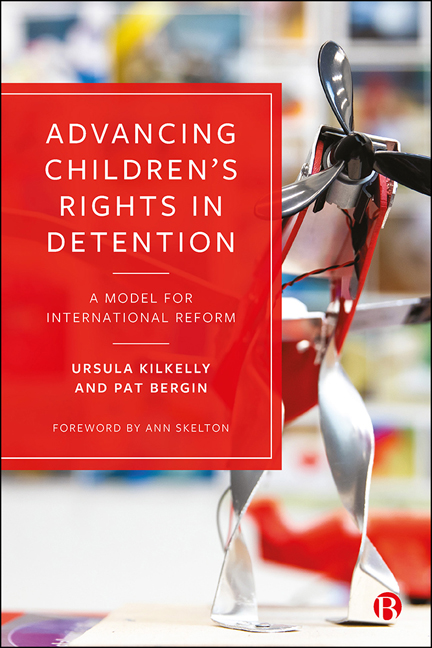Book contents
- Frontmatter
- Contents
- List of Cases and Instruments
- List of Figures
- About the Authors
- Acknowledgements
- Foreword
- Introduction
- 1 Children’s Rights in Detention
- 2 An International Perspective
- 3 Irish Youth Justice Law and Policy
- 4 Introducing Child Detention in Ireland
- 5 Oberstown and the Process of Change
- 6 Implementing Children’s Rights in Detention
- 7 Children’s Rights to Protection from Harm
- 8 Staff Wellbeing and Communication
- 9 International and National Influences and Advocacy
- 10 Reflections: Enablers and Barriers to Reform
- Afterword
- References
- Index
2 - An International Perspective
Published online by Cambridge University Press: 13 May 2022
- Frontmatter
- Contents
- List of Cases and Instruments
- List of Figures
- About the Authors
- Acknowledgements
- Foreword
- Introduction
- 1 Children’s Rights in Detention
- 2 An International Perspective
- 3 Irish Youth Justice Law and Policy
- 4 Introducing Child Detention in Ireland
- 5 Oberstown and the Process of Change
- 6 Implementing Children’s Rights in Detention
- 7 Children’s Rights to Protection from Harm
- 8 Staff Wellbeing and Communication
- 9 International and National Influences and Advocacy
- 10 Reflections: Enablers and Barriers to Reform
- Afterword
- References
- Index
Summary
Introduction
Despite the proliferation of international instruments setting standards and expectations for the protection of children's rights, significant gaps remain between these standards and children's lived experiences of their rights in detention (Liefaard, 2008). The failure to adequately protect and fulfil the rights of children deprived of liberty is well documented (Nowak, 2019), while the disproportionate effects of detention on children from minority and disadvantaged backgrounds now dominate international discourse. While there is extensive literature – from academic and other sources – on children in detention, the aim of this chapter is to take a global view of children's experiences of their rights in detention. Accordingly, the chapter presents a global perspective not on children in detention per se, but on the implementation of international children's rights standards in detention. In this regard, it aims first to identify the main gaps that exist between children's rights in theory and their enjoyment in practice. Second, in considering some of the reforms taking place, the chapter details the advocacy and academic contributions that have helped to underpin these changes. Overall, the chapter seeks to provide the reader with a global lens through which the challenges of advancing children's rights in detention can be understood.
The chapter draws on a range of materials. First, it considers the observations of the international human rights bodies that examine state progress in the implementation of children's rights in detention. Particular use is made of the Concluding Observations of the United Nations Committee on the Rights of the Child (the CRC Committee) and the reports of the European Committee for the Prevention of Torture and Inhuman or Degrading Treatment of Punishment (the CPT) and other such bodies. Second, the chapter draws on reports by advocacy groups that identify key areas of concern nationally and internationally. Combined with the academic literature, the chapter considers the contribution of the Global Study on Children Deprived of Liberty in an effort to draw together the international themes relating to children's rights in detention.
Key global concerns
The CRC Committee regularly raises the treatment of children deprived of liberty in its national dialogue with state parties about the implementation of the United Nations Convention on the Rights of the Child (CRC), and its Concluding Observations reveal serious concerns about the rights of children in detention across a number of jurisdictions.
- Type
- Chapter
- Information
- Advancing Children's Rights in DetentionA Model for International Reform, pp. 20 - 34Publisher: Bristol University PressPrint publication year: 2021



